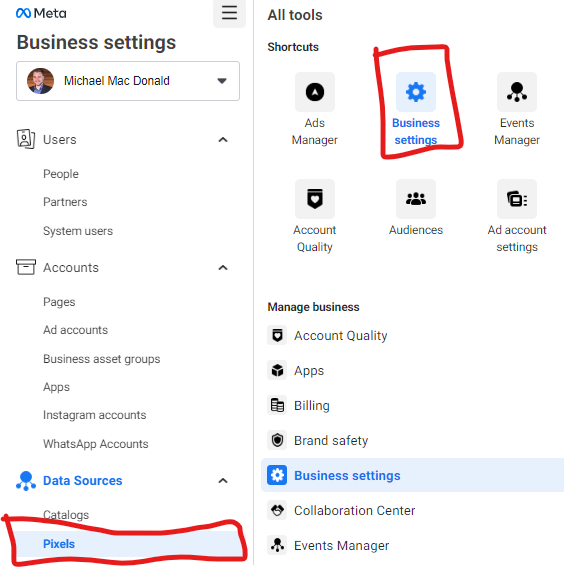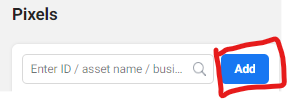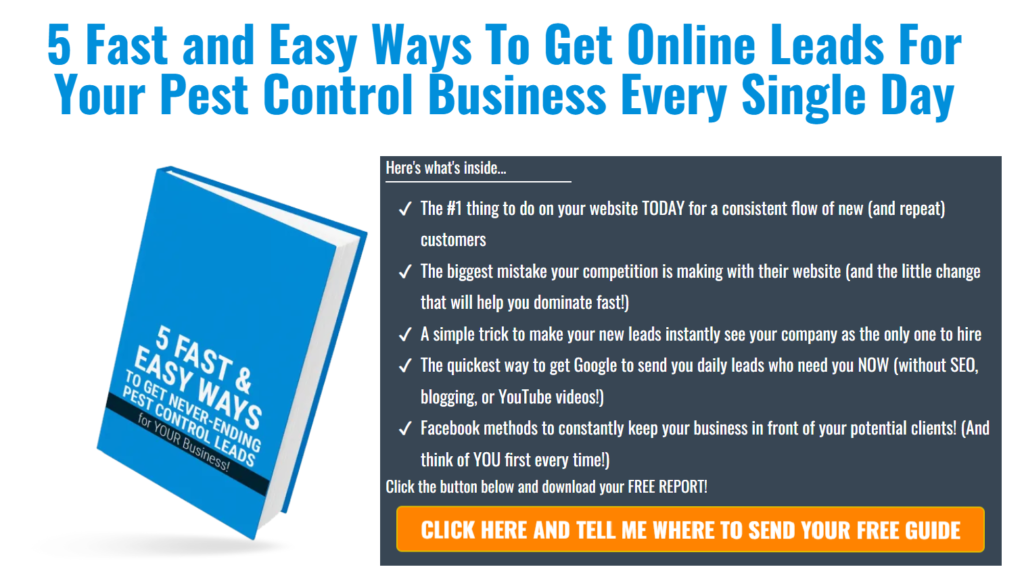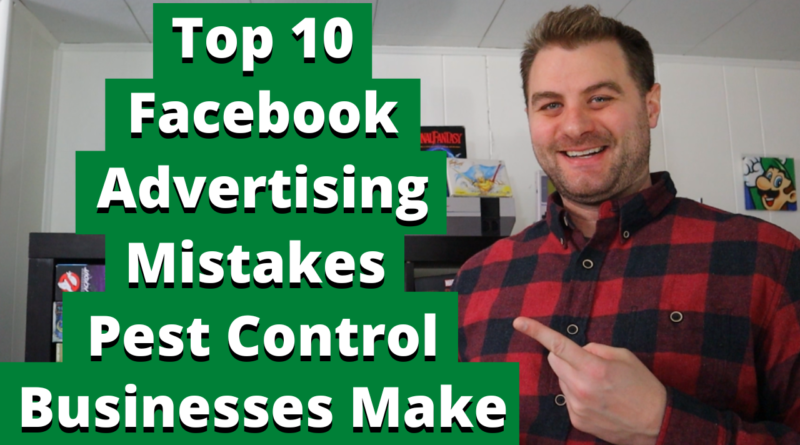Top 10 Facebook Advertising Mistakes Pest Control Companies Make
Facebook advertising is a great marketing idea for pest control companies, however, a lot of people make mistakes with Facebook ads. If you make some of the most common Facebook advertising mistakes your Facebook ads could be a waste of money rather than a huge profit. In this post, you’ll learn the top 10 Facebook advertising mistakes pest control companies make so you can avoid them!
1. You didn’t optimize your pest control website before advertising on Facebook
When most people think of Facebook advertising mistakes they believe everything must relate to the Facebook ads platform itself. The reality is that there are several outside factors that could be a reason why your Facebook ads aren’t working.
One of these common Facebook advertising mistakes is that your pest control website isn’t optimized for conversions. There are many factors that can impact conversion rates on your pest control website.
The first is the overall website design. If your pest control website doesn’t look professional and lacks real photos it can come across as illegitimate. When people come to your website they want to find a professional-looking website. On top of that, you need to make sure that your website is mobile-friendly and runs quickly.
When you run Facebook ads, a large majority of your traffic will end up coming from mobile devices. If your website formatting isn’t adaptive it can cause a major drop off in leads and potential customers.
You also want to make sure there is some type of means of lead generation right when people reach your website. This could be a free estimate button, a callable phone number, or some kind of way for people to opt-in for more information. Most people who visit your site for the first time aren’t ready to buy so you need a means of capturing their info.
2. You Didn’t Install the Facebook Pixel / Meta Pixel on Your Pest Control Website
Another major Facebook advertising mistake pest control companies make is they don’t properly install the Facebook Pixel on their website. Part of this process is to set up a business manager account.
A Facebook business manager account can allow you to advertise and manage your business as a 3rd party. This means you won’t need to rely on your personal ad account and it gives you more features to give access to other business partners.
For example, if you wanted to hire a marketing agency you can give them access to your business and manage certain permissions they can access. Set this up first and then install a Facebook pixel / Meta pixel on your pest control website.
How To Install A Facebook Pixel / Meta Pixel On Your Website
1. From your business manager settings click on data sources and then pixels

2. Click on the add button to create a new Facebook pixel / Meta Pixel

3. Next head to the events manager and the data sources tab

4. Click on add event and From a New Website

5. Click on Mannually add pixel code to website to get the Facebook pixel code

6. Install Meta Pixel / Facebook Pixel code in your website header

You can have your website designer install this for you or have a marketing agency do this as well. If you are trying to do it on your own there are a variety of website plugins that allow you to insert code into your website header. One we’ve used on WordPress websites is called WPCode.
Once you have your Facebook pixel installed you can properly track your website visitors and specific events visitors take. This can be events like becoming a lead, initiating a checkout, and even purchases.
A common Facebook advertising mistake is to skip this part and you miss out on valuable conversion optimization opportunities.
3. Your Pest Control Facebook Ads Aren’t Using The Right Objective
Another common Facebook advertising mistake for pest control companies is optimizing for the wrong objective. This often happens when people are trying to generate sales from their Facebook ads. For example, many people will post a Facebook ad that links to their request an estimate page, a contact page, or a free pest inspection page.
This isn’t a bad place to send people, but if you optimized that ad for clicks, you aren’t making the most of your ads. Even worse you might choose an objective like optimizing for engagement or running a like campaign.
While these types of objectives aren’t inherently bad, they can lead to little to no results if they aren’t used effectively or at the wrong time. Engagement ads and like campaigns can work as part of your remarketing strategy but if you are only using them in hopes of making sales it won’t work well.
You should choose objectives that optimize for conversions if you are hoping to make sales or generate leads. These are your best bets to start with so your Facebook ads can fully optimize.
When you choose the wrong objective it optimizes your ads for results you aren’t seeking. This is the case when you optimize for clicks but you are sending someone to your free pest inspection page. Clicks are nice, but you really want conversions so optimize for them.

4. Your Messaging Only Talks About Features VS Benefits
Having the wrong messaging is a common Facebook advertising mistake that pest control companies make. The reality is that when you only talk about the features of your pest control service you will look like every other company.
The average pest control client sees features like wasp removal, barrier treatments, exclusion, bed bug removal, and rodent control as the exact same from company to company. So if all you talk about is features and that you offer pest removal your Facebook ads will miss the mark.
You need your messaging to be compelling and to stand out and how you do that is by focusing on benefits messaging. Framing your pest control services in terms of benefits is actually very simple.
You just need to think about what feelings people get from the features of your pest control services. For example, when you have a pest-free home, you have much better peace of mind. Often people try DIY pest control and buy over-the-counter products and end up wasting time and money using products that don’t work.
These are three powerful benefits you can highlight in your messaging. You help save people time and money on services that work, and you give them peace of mind knowing that they will have a pest-free home. Focus on these types of things beyond just features and your pest control Facebook ads will convert much better.
5. You Only Use Stock Photos VS Real Photos
Another key element that will separate your pest control Facebook ads from everyone else is if you are using real photos vs stock photos. A common Facebook advertising mistake for pest control companies is running ads that only use stock photos.
If you are just getting started that may be your only option, but the sooner you can incorporate real photos into your Facebook ads the better. One key to successful advertising and pest control marketing, in general, is to build trust with potential customers.
Most people can spot stock photos from a mile away. These stock photos will either stand out in a bad way or will be completely ignored by your potential customers. You want people to stop scrolling when they see your ads in the Facebook newsfeed.
One way to do that is to post real photos of your pest control technicians in action. The key is to have your photos be high-resolution photos with good lighting that tells a story.
What we mean by telling a story is that in a few seconds, you can tell what is happening in the photo. For example, if you offer a barrier treatment for homes, you may include photos of your pest control technicians in action spraying around the home.
Another benefit of real photos is that they mesh well with the existing Facebook newsfeed. Most people don’t post stock photos organically, so you shouldn’t either whenever possible.
6. You Aren’t Advertising Throughout The Entire Buyers Journey Of Your Potential Pest Control Clients
You also want to avoid the Facebook advertising mistake of only advertising for the sale. When you run Facebook ads for a pest control company you want to target every aspect of the buyer’s journey.
This means that you want to hit people in the awareness stage all the way through to the buying stage. You might even consider running Facebook ads that up sell your pest control clients on additional services.
The way to advertise your pest control company this way is to start with a simple value-based campaign. This could be a short video where you educate people on the value of pest control or give pest control tips.
You can target people who may be in the interest stage of their buying journey by offering them a lead magnet like a pest-proofing guide. Use some method of lead generation that isn’t directly asking for a quote.
The next level of targeting is to reach people that are ready to request a quote or that are looking to get a pest inspection. These are people who either already have a pest issue or think they might. Finally, you can market ongoing pest control to those who are already a customer in the form of some kind of maintenance service.
7. You Didn’t Use Social Proof In Your Facebook Ads
Not incorporating social proof into your Facebook ads for a pest control company is a big mistake. Social proof can help build credibility and authority for your pest control business.
Most people will do business with pest control companies that they know, like, and trust. For a pest control company, social proof can come in the form of customer reviews, testimonials, and ratings.
By including these in its ads, the company can demonstrate its expertise and reliability, making it more likely for potential customers to trust their services and take action.
When people are in research mode and deciding which pest control company to hire, they often check reviews of a company. The overall review ratings of your pest control company can be a key deciding factor on whether a person hires you or not.
Make it easy on your potential customers and simply advertise your positive reviews and social proof right in your ads to increase conversions!
8. You Aren’t Retargeting Your Pest Control Website Visitors
Similar to not advertising through the entire buyer’s journey, another one of the common Facebook advertising mistakes is not using retargeting ads. When you install a Facebook pixel on your pest control website it gathers extremely valuable data.
A huge benefit of this data is that you can build remarketing Facebook ads to then target each level of the buyer’s journey with ads relevant to that stage. The goal of this remarketing process is to continually be guiding people from having never heard of your pest control company to becoming customers.
Imagine someone coming to your website to decide if they should hire you and they don’t, but as soon as they sign on to Facebook they see your ad. When you have this omnipresence in your pest control marketing plan, your conversions will be much higher.
Plus, this is a great way to combine your efforts from multiple advertising platforms. Take Google Ads as an example. People might be actively searching for a pest control company to hire and click on your Google ad. Even if they don’t hire you immediately, they are tagged with the Facebook pixel and can now be a part of your remarketing ad campaigns.
Another benefit of remarketing ads on Facebook is that the cost is often very low. Since you are targeting people who already know you, the likelihood that they click on your ads and convert is much higher. This means you don’t need to spend as much as you would compared to a cold audience to get conversions. Don’t make this Facebook advertising mistake and use remarketing in your Facebook advertising strategy.
9. You Aren’t Tracking your results to Optimize Your Ads
Testing and tracking your results is a crucial factor for optimizing your Facebook advertising strategy. One of the top Facebook advertising mistakes we see pest control companies make is thinking paid advertising is “set it and forget it”.
The reality is that you can have experts craft your Facebook ads, target the people you think will resonate most, and still end up off the target. Certainly hiring a pest control marketing agency with experience is better than DIY pest control marketing. However, even the best marketers don’t get it right 100% of the time.
This is why you need to implement tracking tools in your advertising strategy so you can continue to optimize your results. We already talked about installing the Facebook pixel on your pest control website, but you want to then analyze your key metrics from your ads.
A couple to pay close attention to are the cost per conversion, cost per click, click-through rate, and landing page view percentage. The benefit of knowing your cost per conversion is pretty obvious and you should track that and strive to lower that over time.
When it comes to the cost per click and click-through rate those can give you insights on what might need to be optimized in your ads. For example, if your cost-per-click or click-through rate is high, this could mean that you are targeting the wrong audience, or that your messaging and offer isn’t resonating with that audience.
If your landing page view percentage (those who click the ad and actually wait for the landing page to load) is high it could mean your page load speed is poor. It could also mean your landing page isn’t mobile-friendly. Not knowing these key metrics and how to optimize your ads are huge Facebook advertising mistakes.
10. You Don’t Have An Email Follow Up Series In Place
The 10th most common of the Facebook advertising mistakes for pest control companies that we see is a lack of follow-up with pest control leads. This comes in a few ways. One is a lack of in-person follow-up from your sales team.
If you aren’t following up quickly and guiding a new pest control lead into the next step of the sales process, it doesn’t matter how effective your Facebook advertising strategy is. You can generate hundreds of pest control leads, but if the back-end follow-up isn’t optimized you will struggle to convert those leads.
Obviously, you need an in-person sales process in place in addition to marketing, but a common Facebook advertising mistake is to not have a follow-up email series that your pest control leads enter.
When a new pest control lead comes in, they still may not be ready to hire your pest control services. This means you need some form of lead nurturing to turn these pest control leads into warm leads that are ready to buy.
An automated email follow-up series can help you warm up your pest control leads that you get from Facebook ads, and turn them into ready-to-buy leads. The key to this type of email series is that you want it to provide value and educate potential customers on the benefits of pest control.
Sell them on the benefits through education about pest control and your conversion rates of these leads will skyrocket!
Don’t Feel Like You Have To Master Facebook Advertising for Pest Control Companies To Get Started
As we mentioned before Facebook Advertising can cost you money if you don’t know what you are doing. There is definitely a learning curve to it, but if you’ve struggled with getting results with Facebook ads before, it doesn’t mean that they don’t work. Facebook advertising for pest control companies is one of the best pest control advertising ideas there is.
Stop trying to figure out the ever-changing landscape of running Facebook ads for your pest control business. Hire an expert pest control marketing agency that already knows how to run Facebook ads for your pest control company.
This may be a bigger investment initially VS trying to run ads on your own, but you’ll save all of the wasted money you would have spent on trial and error. Let an expert pest control marketing agency like our team run your Facebook ads for you, so you can do what you do best. Running your pest control business!
If you haven’t ever hired a marketing agency before, or haven’t had good results in the past, schedule a digital marketing audit with our team so we can show you exactly what you need to do to get results for your pest control business.
Also if you’d like to learn more about working with our agency to help you set up profitable Facebook ads and more, click here to apply for a free strategy call.


